反义疑问句
反意疑问句
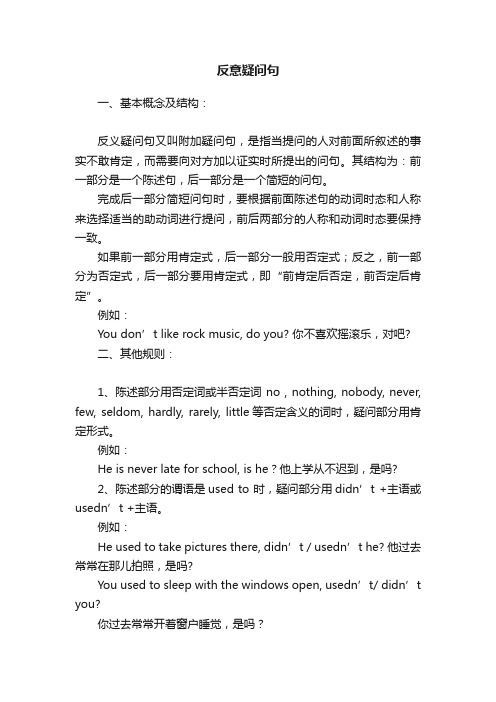
反意疑问句
一、基本概念及结构:
反义疑问句又叫附加疑问句,是指当提问的人对前面所叙述的事实不敢肯定,而需要向对方加以证实时所提出的问句。其结构为:前一部分是一个陈述句,后一部分是一个简短的问句。
完成后一部分简短问句时,要根据前面陈述句的动词时态和人称来选择适当的助动词进行提问,前后两部分的人称和动词时态要保持一致。
如果前一部分用肯定式,后一部分一般用否定式;反之,前一部分为否定式,后一部分要用肯定式,即“前肯定后否定,前否定后肯定”。
例如:
You don’t like rock music, do you? 你不喜欢摇滚乐,对吧?
二、其他规则:
1、陈述部分用否定词或半否定词 no , nothing, nobody, never, few, seldom, hardly, rarely, little等否定含义的词时,疑问部分用肯定形式。
例如:
He is never late for school, is he?他上学从不迟到,是吗?
2、陈述部分的谓语是used to 时,疑问部分用didn’t +主语或usedn’t +主语。
例如:
He used to take pictures there, didn’t / usedn’t he? 他过去常常在那儿拍照,是吗?
You used to sleep with the windows open, usedn’t/ didn’t you?
你过去常常开着窗户睡觉,是吗?
3、陈述部分为祈使句时,祈使句后加附加问句,不表示反意,而表示一种语气。其结构为:
反意疑问句大全
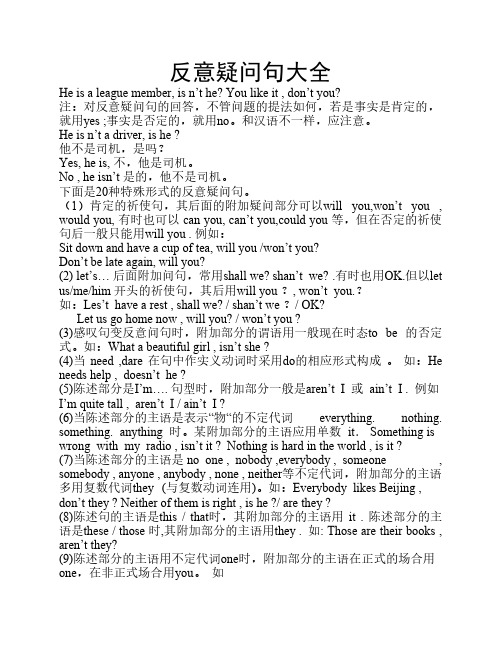
反意疑问句大全
He is a league member, is n’t he? You like it , don’t you?
注:对反意疑问句的回答,不管问题的提法如何,若是事实是肯定的,就用yes ;事实是否定的,就用no。和汉语不一样,应注意。
He is n’t a driver, is he ?
他不是司机,是吗?
Yes, he is, 不,他是司机。
No , he isn’t 是的,他不是司机。
下面是20种特殊形式的反意疑问句。
(1)肯定的祈使句,其后面的附加疑问部分可以will you,won’t you , would you, 有时也可以 can you, can’t you,could you 等,但在否定的祈使句后一般只能用will you . 例如:
Sit down and have a cup of tea, will you /won’t you?
Don’t be late again, will you?
(2) let’s… 后面附加问句,常用shall we? shan’t we? .有时也用OK.但以let us/me/him 开头的祈使句,其后用will you ?, won’t you.?
如:Les’t have a rest , shall we? / shan’t we ?/ OK?
Let us go home now , will you? / won’t you ?
(3)感叹句变反意问句时,附加部分的谓语用一般现在时态to be 的否定式。如:What a beautiful girl , isn’t she ?
反义疑问句用法归纳详解
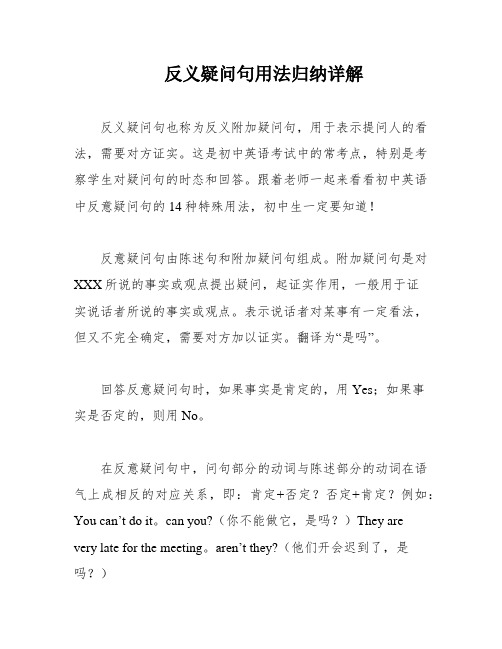
反义疑问句用法归纳详解
反义疑问句也称为反义附加疑问句,用于表示提问人的看法,需要对方证实。这是初中英语考试中的常考点,特别是考察学生对疑问句的时态和回答。跟着老师一起来看看初中英语中反意疑问句的14种特殊用法,初中生一定要知道!
反意疑问句由陈述句和附加疑问句组成。附加疑问句是对XXX所说的事实或观点提出疑问,起证实作用,一般用于证
实说话者所说的事实或观点。表示说话者对某事有一定看法,但又不完全确定,需要对方加以证实。翻译为“是吗”。
回答反意疑问句时,如果事实是肯定的,用Yes;如果事
实是否定的,则用No。
在反意疑问句中,问句部分的动词与陈述部分的动词在语气上成相反的对应关系,即:肯定+否定?否定+肯定?例如:You can’t do it。can you?(你不能做它,是吗?)They are
very late for the meeting。aren’t they?(他们开会迟到了,是吗?)
附加问句的主语应与陈述句的主语保持一致,且只能用人称代词替代。例如:You come from Beijing。don't you?(你来
自北京,是不是?)
当陈述句中含有be动词、助动词或情态动词时,反问句
部分由这些词加上主语人称代词构成。例如:He will go home。won’t he?(他要回家了,是吗?)She doesn’t like to eat popcorn。does she?(她不喜欢吃爆米花,是吗?)
在使用have时,反义疑问句的动词需根据具体语境决定。当have表“有”时,反义疑问句谓语动词可用have或do。例如:He has a new car。doesn’t/hasn’t he。当have表“吃、喝、玩、
英语反意疑问句的20种句型
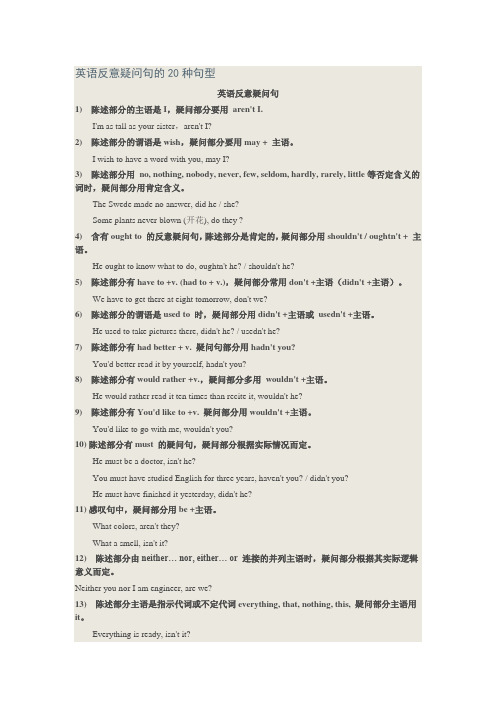
英语反意疑问句的20种句型
英语反意疑问句
1)陈述部分的主语是I,疑问部分要用aren't I.
I'm as tall as your sister,aren't I?
2)陈述部分的谓语是wish,疑问部分要用may + 主语。
I wish to have a word with you, may I?
3)陈述部分用no, nothing, nobody, never, few, seldom, hardly, rarely, little等否定含义的词时,疑问部分用肯定含义。
The Swede made no answer, did he / she?
Some plants never blown (开花), do they ?
4)含有ought to 的反意疑问句,陈述部分是肯定的,疑问部分用shouldn't / oughtn't + 主语。
He ought to know what to do, oughtn't he? / shouldn't he?
5)陈述部分有have to +v. (had to + v.),疑问部分常用don't +主语(didn't +主语)。
We have to get there at eight tomorrow, don't we?
6)陈述部分的谓语是used to 时,疑问部分用didn't +主语或usedn't +主语。
He used to take pictures there, didn't he? / usedn't he?
7)陈述部分有had better + v. 疑问句部分用hadn't you?
反义疑问句例句20个
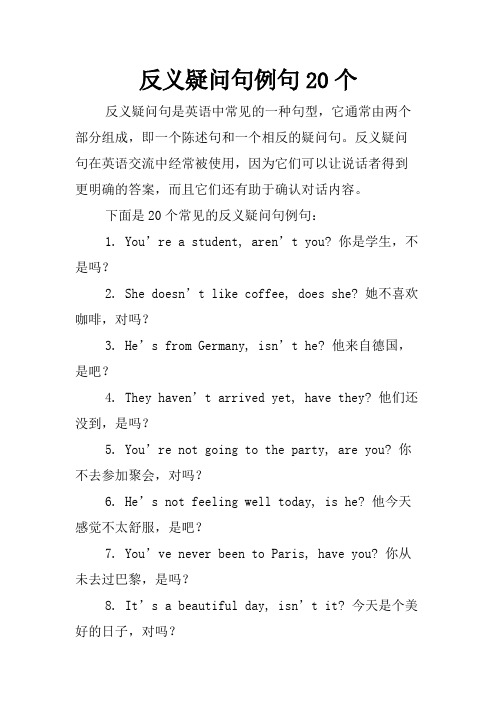
反义疑问句例句20个
反义疑问句是英语中常见的一种句型,它通常由两个部分组成,即一个陈述句和一个相反的疑问句。反义疑问句在英语交流中经常被使用,因为它们可以让说话者得到更明确的答案,而且它们还有助于确认对话内容。
下面是20个常见的反义疑问句例句:
1. You’re a student, aren’t you? 你是学生,不是吗?
2. She doesn’t like coffee, does she? 她不喜欢咖啡,对吗?
3. He’s from Germany, isn’t he? 他来自德国,是吧?
4. They haven’t arrived yet, have they? 他们还没到,是吗?
5. You’re not going to the party, are you? 你不去参加聚会,对吗?
6. He’s not feeling well today, is he? 他今天感觉不太舒服,是吧?
7. You’ve never been to Paris, have you? 你从未去过巴黎,是吗?
8. It’s a beautiful day, isn’t it? 今天是个美好的日子,对吗?
9. He can’t swim, can he? 他不会游泳,对吗?
10. She doesn’t like pizza, does she? 她不喜欢披萨,对吗?
11. You’re not afraid of heights, are you? 你不怕高,对吗?
12. They won’t be able to attend the meeting, will they? 他们不能参加会议,对吗?
什么是反意疑问句
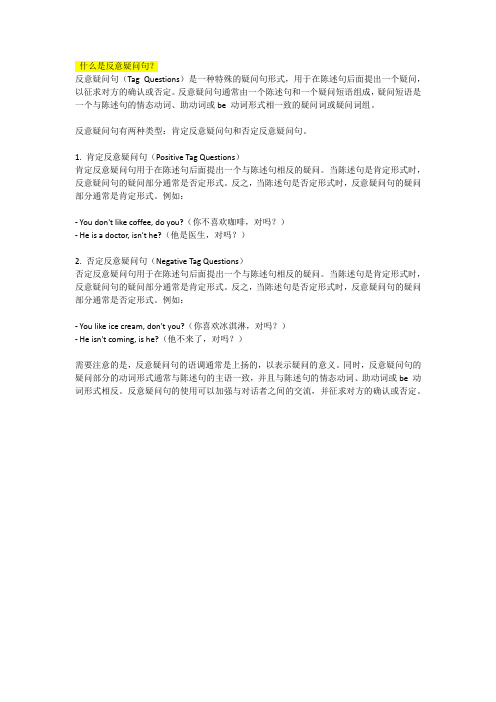
什么是反意疑问句?
反意疑问句(Tag Questions)是一种特殊的疑问句形式,用于在陈述句后面提出一个疑问,以征求对方的确认或否定。反意疑问句通常由一个陈述句和一个疑问短语组成,疑问短语是一个与陈述句的情态动词、助动词或be 动词形式相一致的疑问词或疑问词组。
反意疑问句有两种类型:肯定反意疑问句和否定反意疑问句。
1. 肯定反意疑问句(Positive Tag Questions)
肯定反意疑问句用于在陈述句后面提出一个与陈述句相反的疑问。当陈述句是肯定形式时,反意疑问句的疑问部分通常是否定形式。反之,当陈述句是否定形式时,反意疑问句的疑问部分通常是肯定形式。例如:
- You don't like coffee, do you?(你不喜欢咖啡,对吗?)
- He is a doctor, isn't he?(他是医生,对吗?)
2. 否定反意疑问句(Negative Tag Questions)
否定反意疑问句用于在陈述句后面提出一个与陈述句相反的疑问。当陈述句是肯定形式时,反意疑问句的疑问部分通常是肯定形式。反之,当陈述句是否定形式时,反意疑问句的疑问部分通常是否定形式。例如:
- You like ice cream, don't you?(你喜欢冰淇淋,对吗?)
- He isn't coming, is he?(他不来了,对吗?)
需要注意的是,反意疑问句的语调通常是上扬的,以表示疑问的意义。同时,反意疑问句的疑问部分的动词形式通常与陈述句的主语一致,并且与陈述句的情态动词、助动词或be 动词形式相反。反意疑问句的使用可以加强与对话者之间的交流,并征求对方的确认或否定。
英语反义疑问句详解
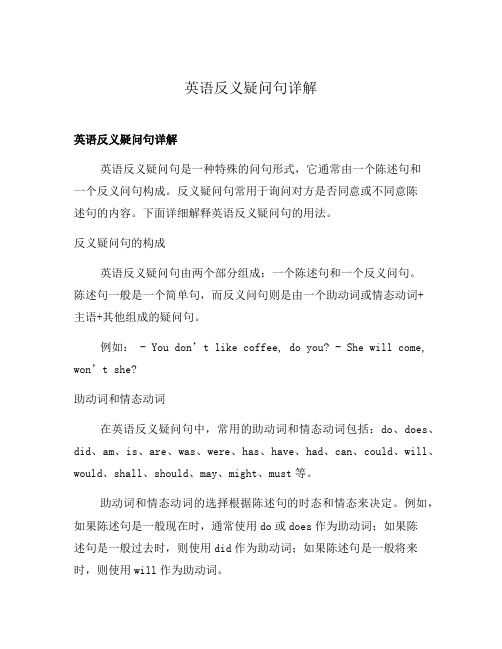
英语反义疑问句详解
英语反义疑问句详解
英语反义疑问句是一种特殊的问句形式,它通常由一个陈述句和
一个反义问句构成。反义疑问句常用于询问对方是否同意或不同意陈
述句的内容。下面详细解释英语反义疑问句的用法。
反义疑问句的构成
英语反义疑问句由两个部分组成:一个陈述句和一个反义问句。
陈述句一般是一个简单句,而反义问句则是由一个助动词或情态动词+
主语+其他组成的疑问句。
例如: - You don’t like coffee, do you? - She will come, won’t she?
助动词和情态动词
在英语反义疑问句中,常用的助动词和情态动词包括:do、does、did、am、is、are、was、were、has、have、had、can、could、will、would、shall、should、may、might、must等。
助动词和情态动词的选择根据陈述句的时态和情态来决定。例如,如果陈述句是一般现在时,通常使用do或does作为助动词;如果陈
述句是一般过去时,则使用did作为助动词;如果陈述句是一般将来时,则使用will作为助动词。
主语和其他
反义疑问句中的主语和其他成分与陈述句保持一致。如果陈述句的主语是第一人称(I)、第二人称(you)或不具体的第三人称(everyone、nothing等),则在反义问句中保持不变。如果陈述句的主语是第三人称具体的名词或代词,则在反义问句中使用相应的人称
代词。
例如: - She likes ice cream, doesn’t she? - They don’t have a car, do they?
反义疑问句六大句型
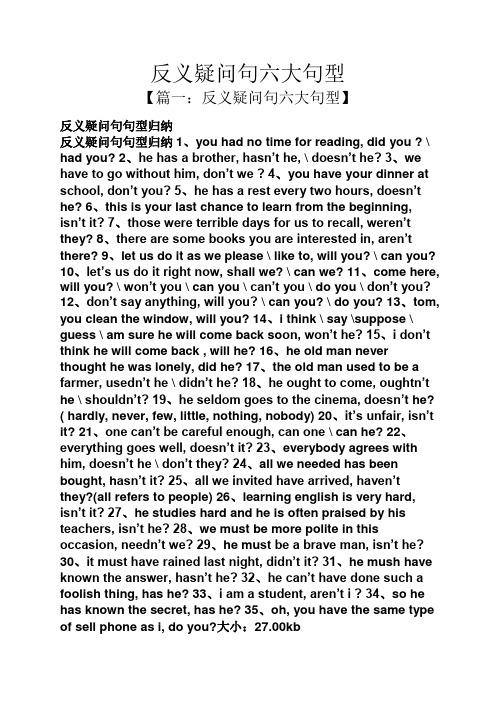
反义疑问句六大句型
【篇一:反义疑问句六大句型】
反义疑问句句型归纳
反义疑问句句型归纳1、you had no time for reading, did you ? \ had you? 2、he has a brother, hasn’t he, \ doesn’t he? 3、we have to go without him, don’t we ? 4、you have your dinner at school, don’t you? 5、he has a rest every two hours, doesn’t he? 6、this is your last chance to learn from the beginning, isn’t it? 7、those were terrible days for us to recall, weren’t they? 8、there are some books you are interested in, aren’t there? 9、let us do it as we please \ like to, will you? \ can you?
10、let’s us do it right now, sh all we? \ can we? 11、come here, will you? \ won’t you \ can you \ can’t you \ do you \ don’t you?
12、don’t say anything, will you? \ can you? \ do you? 13、tom, you clean the window, will you? 14、i think \ say \suppose \ guess \ am sure he will come back so on, won’t he? 15、i don’t think he will come back , will he? 16、he old man never
反义疑问句例子
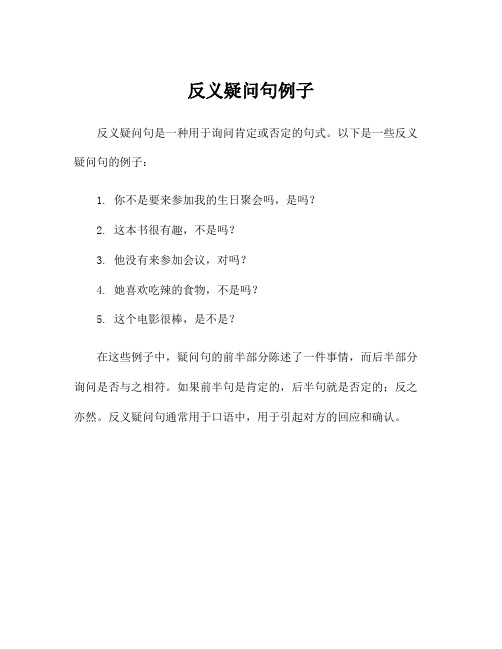
反义疑问句例子
反义疑问句是一种用于询问肯定或否定的句式。以下是一些反义疑问句的例子:
1.你不是要来参加我的生日聚会吗,是吗?
2.这本书很有趣,不是吗?
3.他没有来参加会议,对吗?
4.她喜欢吃辣的食物,不是吗?
5.这个电影很棒,是不是?
在这些例子中,疑问句的前半部分陈述了一件事情,而后半部分询问是否与之相符。如果前半句是肯定的,后半句就是否定的;反之亦然。反义疑问句通常用于口语中,用于引起对方的回应和确认。
反义疑问句的用法和句式
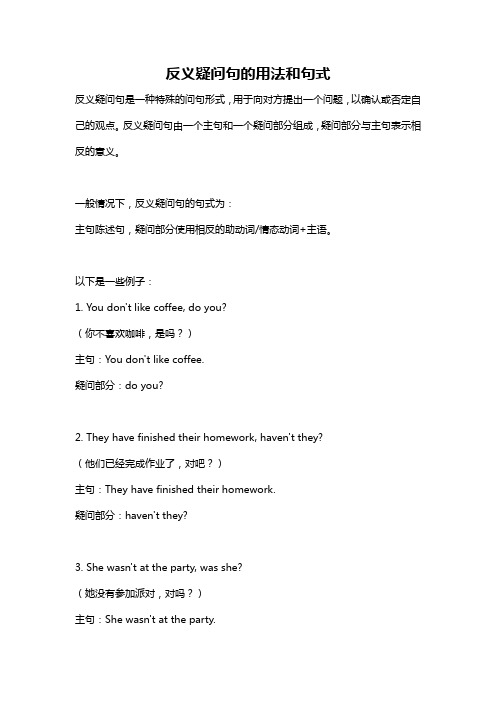
反义疑问句的用法和句式
反义疑问句是一种特殊的问句形式,用于向对方提出一个问题,以确认或否定自己的观点。反义疑问句由一个主句和一个疑问部分组成,疑问部分与主句表示相反的意义。
一般情况下,反义疑问句的句式为:
主句陈述句,疑问部分使用相反的助动词/情态动词+主语。
以下是一些例子:
1. You don't like coffee, do you?
(你不喜欢咖啡,是吗?)
主句:You don't like coffee.
疑问部分:do you?
2. They have finished their homework, haven't they?
(他们已经完成作业了,对吧?)
主句:They have finished their homework.
疑问部分:haven't they?
3. She wasn't at the party, was she?
(她没有参加派对,对吗?)
主句:She wasn't at the party.
疑问部分:was she?
4. He can't swim, can he?
(他不会游泳,对吗?)
主句:He can't swim.
疑问部分:can he?
需要注意的是,在反义疑问句中,疑问部分的助动词/情态动词与主句的时态和人称保持一致,并使用正式陈述的词序(即将助动词/情态动词置于主语之前)。同时,反义疑问句通常用于口语交流中,以期望得到对方的确认或否定。
反义疑问句(最全)
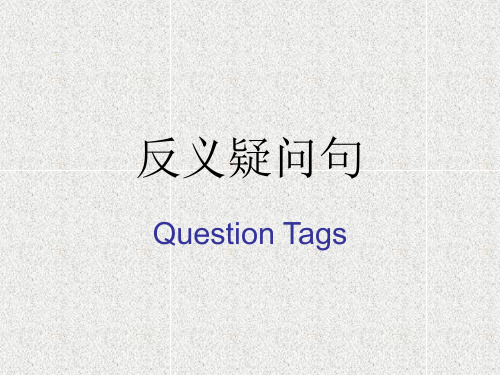
—、一些特殊结构的反义疑问句:
1.含有ought to 的反意疑问句,陈述部分是肯定的,疑 问部分用shouldn’t / oughtn’t +主语。 He ought to know what to do, oughtn’t he? / shouldn’t he?
2.陈述部分有have/has to +v. (had to + v.),疑问部分常 用don’t/doesn’t +主语(didn’t +主语)。 We have to get there at eight tomorrow, don’t we?
D.must表示推测 ,其疑问部分必须与must 后面的主要动词相 呼应 ①对现在动作或存在的情况的推测(don’t +主语) You must know the answer to the exercise, don’t you? ②对过去发生的动作或存在的情况的推测有两种情况:
反义疑问句超详细讲解!!!
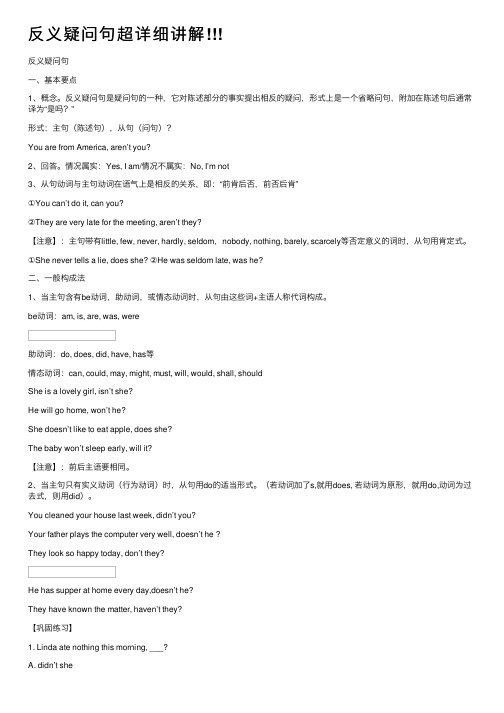
反义疑问句超详细讲解
反义疑问句
⼀、基本要点
1、概念。反义疑问句是疑问句的⼀种,它对陈述部分的事实提出相反的疑问,形式上是⼀个省略问句,附加在陈述句后通常译为“是吗?”
形式:主句(陈述句),从句(问句)?
You are from America, aren’t you?
2、回答。情况属实:Yes, I am/情况不属实:No, I’m not
3、从句动词与主句动词在语⽓上是相反的关系,即:“前肯后否,前否后肯”
①You can’t do it, can you?
②They are very late for the meeting, aren’t they?
【注意】:主句带有little, few, never, hardly, seldom,nobody, nothing, barely, scarcely等否定意义的词时,从句⽤肯定式。
①She never tells a lie, does she? ②He was seldom late, was he?
⼆、⼀般构成法
1、当主句含有be动词,助动词,或情态动词时,从句由这些词+主语⼈称代词构成。
be动词:am, is, are, was, were
助动词:do, does, did, have, has等
情态动词:can, could, may, might, must, will, would, shall, should
She is a lovely girl, isn’t she?
He will go home, won’t he?
反义疑问句例句20个
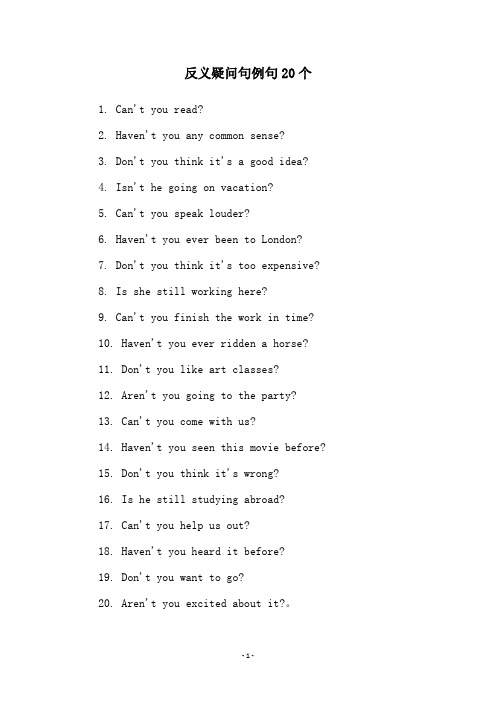
反义疑问句例句20个
1. Can't you read?
2. Haven't you any common sense?
3. Don't you think it's a good idea?
4. Isn't he going on vacation?
5. Can't you speak louder?
6. Haven't you ever been to London?
7. Don't you think it's too expensive?
8. Is she still working here?
9. Can't you finish the work in time?
10. Haven't you ever ridden a horse?
11. Don't you like art classes?
12. Aren't you going to the party?
13. Can't you come with us?
14. Haven't you seen this movie before?
15. Don't you think it's wrong?
16. Is he still studying abroad?
17. Can't you help us out?
18. Haven't you heard it before?
19. Don't you want to go?
20. Aren't you excited about it?。
- 1 -
反意疑问句
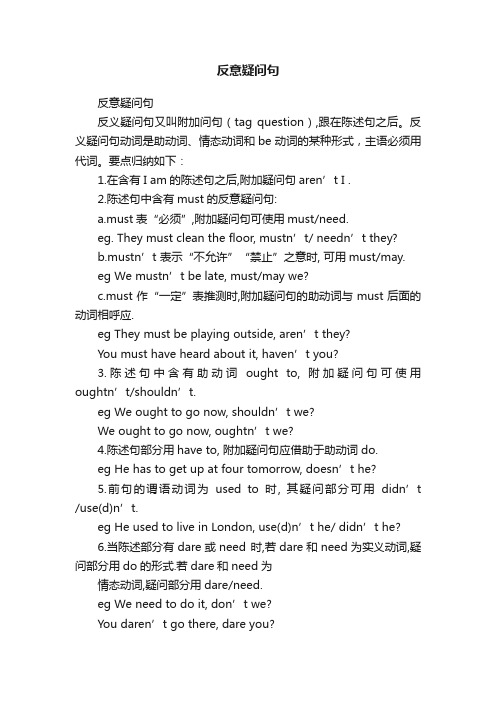
反意疑问句
反意疑问句
反义疑问句又叫附加问句(tag question),跟在陈述句之后。反义疑问句动词是助动词、情态动词和be 动词的某种形式,主语必须用代词。要点归纳如下:
1.在含有I am的陈述句之后,附加疑问句aren’t I .
2.陈述句中含有must的反意疑问句:
a.must表“必须”,附加疑问句可使用must/need.
eg. They must clean the floor, mustn’t/ needn’t they?
b.mustn’t 表示“不允许”“禁止”之意时, 可用must/may.
eg We mustn’t be late, must/may we?
c.must作“一定”表推测时,附加疑问句的助动词与must后面的动词相呼应.
eg They must be playing outside, aren’t they?
You must have heard about it, haven’t you?
3.陈述句中含有助动词ought to, 附加疑问句可使用oughtn’t/shouldn’t.
eg We ought to go now, shouldn’t we?
We ought to go now, oughtn’t we?
4.陈述句部分用have to, 附加疑问句应借助于助动词do.
eg He has to get up at four tomorrow, doesn’t he?
5.前句的谓语动词为used to 时, 其疑问部分可用didn’t /use(d)n’t.
反意疑问句的一般用法大全
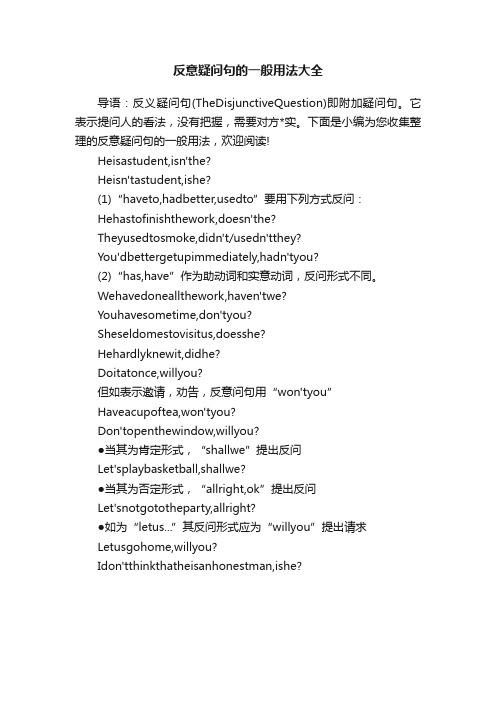
反意疑问句的一般用法大全
导语:反义疑问句(TheDisjunctiveQuestion)即附加疑问句。它表示提问人的看法,没有把握,需要对方*实。下面是小编为您收集整理的反意疑问句的一般用法,欢迎阅读!
Heisastudent,isn'the?
Heisn'tastudent,ishe?
(1)“haveto,hadbetter,usedto”要用下列方式反问:
Hehastofinishthework,doesn'the?
Theyusedtosmoke,didn't/usedn'tthey?
You'dbettergetupimmediately,hadn'tyou?
(2)“has,have”作为助动词和实意动词,反问形式不同。
Wehavedoneallthework,haven'twe?
Youhavesometime,don'tyou?
Sheseldomestovisitus,doesshe?
Hehardlyknewit,didhe?
Doitatonce,willyou?
但如表示邀请,劝告,反意问句用“won'tyou”
Haveacupoftea,won'tyou?
Don'topenthewindow,willyou?
●当其为肯定形式,“shallwe”提出反问
Let'splaybasketball,shallwe?
●当其为否定形式,“allright,ok”提出反问
Let'snotgototheparty,allright?
●如为“letus...”其反问形式应为“willyou”提出请求
反义疑问句英语句型
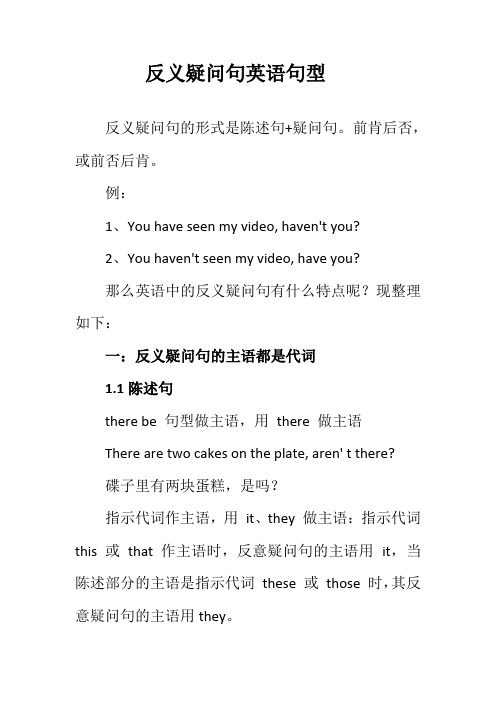
反义疑问句英语句型
反义疑问句的形式是陈述句+疑问句。前肯后否,或前否后肯。
例:
1、You have seen my video, haven't you?
2、You haven't seen my video, have you?
那么英语中的反义疑问句有什么特点呢?现整理如下:
一:反义疑问句的主语都是代词
1.1陈述句
there be 句型做主语,用there 做主语
There are two cakes on the plate, aren' t there?
碟子里有两块蛋糕,是吗?
指示代词作主语,用it、they 做主语:指示代词this 或that 作主语时,反意疑问句的主语用it,当陈述部分的主语是指示代词these 或those 时,其反意疑问句的主语用they。
This is a plane, isn't it?
这是一架飞机,是吗?
These are grapes, aren't they?
这些是葡萄,是吗?
主语是复合不定代词(人)做主语,常用he/they 作主语:somebody (someone), anybody (anyone), nobody (no one), everybody (everyone) none, neither 时,问句部分的主语用he或they,这时问句动词的数应和he 或they 一致。
Someone has taken the seat, hasn't he?
有人已经坐了位置,是吗?
Everyone has done their best in the game, haven't they?
- 1、下载文档前请自行甄别文档内容的完整性,平台不提供额外的编辑、内容补充、找答案等附加服务。
- 2、"仅部分预览"的文档,不可在线预览部分如存在完整性等问题,可反馈申请退款(可完整预览的文档不适用该条件!)。
- 3、如文档侵犯您的权益,请联系客服反馈,我们会尽快为您处理(人工客服工作时间:9:00-18:30)。
反意疑问句。
1、什么是反意疑问句
英语中,反意疑问句是由陈述句和附在其后的附加疑问句组成。反意疑问句有四种类型:(1)肯定陈述+否定简短问句;(2)否定陈述+肯定简短问句;(3)肯定陈述+肯定简短问句;(4)否定陈述+否定简短问句。其中,前两种运用最为广泛。除此之外,反意疑问句还有“祈使句+简短问句”的形式,这种用法通常用于减弱祈使语气。如: Carry this parcel for me, can you? 给我拿一下包,好吗?
陈述部分含“too...to”时,是否定句
2.反意疑问句的结构:陈述句(主语+谓语……),+助动词/情态动词/be动词+主语(代词形式);陈述句部分如果是肯定句,反意疑问句,疑问句部分的助动词/情态动词/be动词+n ot (否定提问);如果陈述句部分是否定句,反意疑问句,疑问句部分用肯定式提问。
用法说明
1.陈述句中是I am时,简短问句则用aren’t I。
I am an excellent English speaker, aren’t I?
I am late, aren’t I ?
I'm as tall as your sister,aren't I?(我和你姐姐一样高,对吗?)
2. 陈述部分的主语是I , 附加疑问句的部分的主语用you,以表示征询对方的意见,这时等于另外的一个句子,相当于how/what about you ?what do you think ?
I like living in the country, don’t you?= I like living in the country, how about you?
I found English interesting, don‘t you?= I found English interesting, what do think?
3.陈述句中是非限定人称代词one时,正式文体中,简短问句的主语为one,而非正式文体中用you。
O ne must love one’s country ,mustn’t one/you?
One shouldn’t be selfish, shouldn’t one/you?
One must be honest, mustn’t one?
4.当陈述部分主语是从句、不定式(短语)、动词-ing形式时,反意疑问句的主语应该用it。
R eading English aloud is very important, isn’t it?
W hat he said was true, wasn’t it?
What you need is more important, isn't it?你需要的东西更重要,是吧?
5.当陈述句的主语是everyone, everybody, someone, somebody时,简短问句中的主语通常用they。如果陈述句的主语是非人称的复合词,如everything, something, anything, 则简短问句中相应的人称代词是单数的中性词it。例如:
Somebody borrowed my coat yesterday, didn’t they?
Nobody came, did they?
Everyone thinks they’re the center of the universe, don’t they?
Nothing can stop us now, can it?
6. 陈述部分主语是不定代词everybody, anyone, somebody, nobody, no one,someone等,疑问部分常用复数they,有时也用单数he.
E veryone knows the answer, don't they? (does he?)
Nobody knows about it, do they? (does he?)
7.陈述部分的主语是指示代词this或that时,反意疑问句的主语用it,当陈述部分的
主语是指示代词these或those时,其反意疑问句的主语用they。例如:
T his is a plane, isn't it? 这是一架飞机,是吗?
These are grapes,aren't they? 这些是葡萄,是吗?
This is an English book, isn’t it?
These are English books, aren’t they?
8.陈述部分的主语是each of 时,如果强调单个,附加疑问句子的主语用he或it;如果强
调全体,则根据情况用they,we,you等。
E ach of the books costs us five yuan, didn’t we?
Each of us bought a postcard, didn’t we ?
9.陈述部分的主语是none of 。。。时,附加疑问句部分的主语应与of后的名词或代词保
持一致。
None of the students went there, did they?
None of the dish smells good, does it?
10.have
如果陈述句的谓语动词是have (当“拥有”讲时), 简短问句可用have形式或用
do形式。例如:
You have a nice house, haven’t/don’t you?
但如果陈述句是否定形式时,简短问句中动词的选择则由陈述句中的动词形式而定。
He hasn’t a house of his own, has he?
He doesn’t have a house of his own, does he?
陈述部分有have to +v. (had to + v.),疑问部分常用do的相应形式(don't /di
dn't +主语)。例如:
You have to water the vegetables every day, don't you? 你每天都要浇菜,对吧?
We have to get there at eight tomorrow, don't we?
如果陈述句中的动词have 表示“经历,遭受,得到,吃”的意思时,则简短问句
中的动词用do的形式。例如:
You often have headaches, don’t you?
11.陈述句中的动词是used to时,简短问句可用used 的形式或did的形式。例如: The Smiths used to live in the countryside, usedn’t / didn’t they?
He didn’t use/used to tell lies, did he?
He used to take pictures there, didn't he? / usedn't he?
12.陈述部分有had better时,反意疑问句中要用hadn't。例如:
W e had better go to school at once, hadn't we? 我们现在最好马上去上学,好吗?
